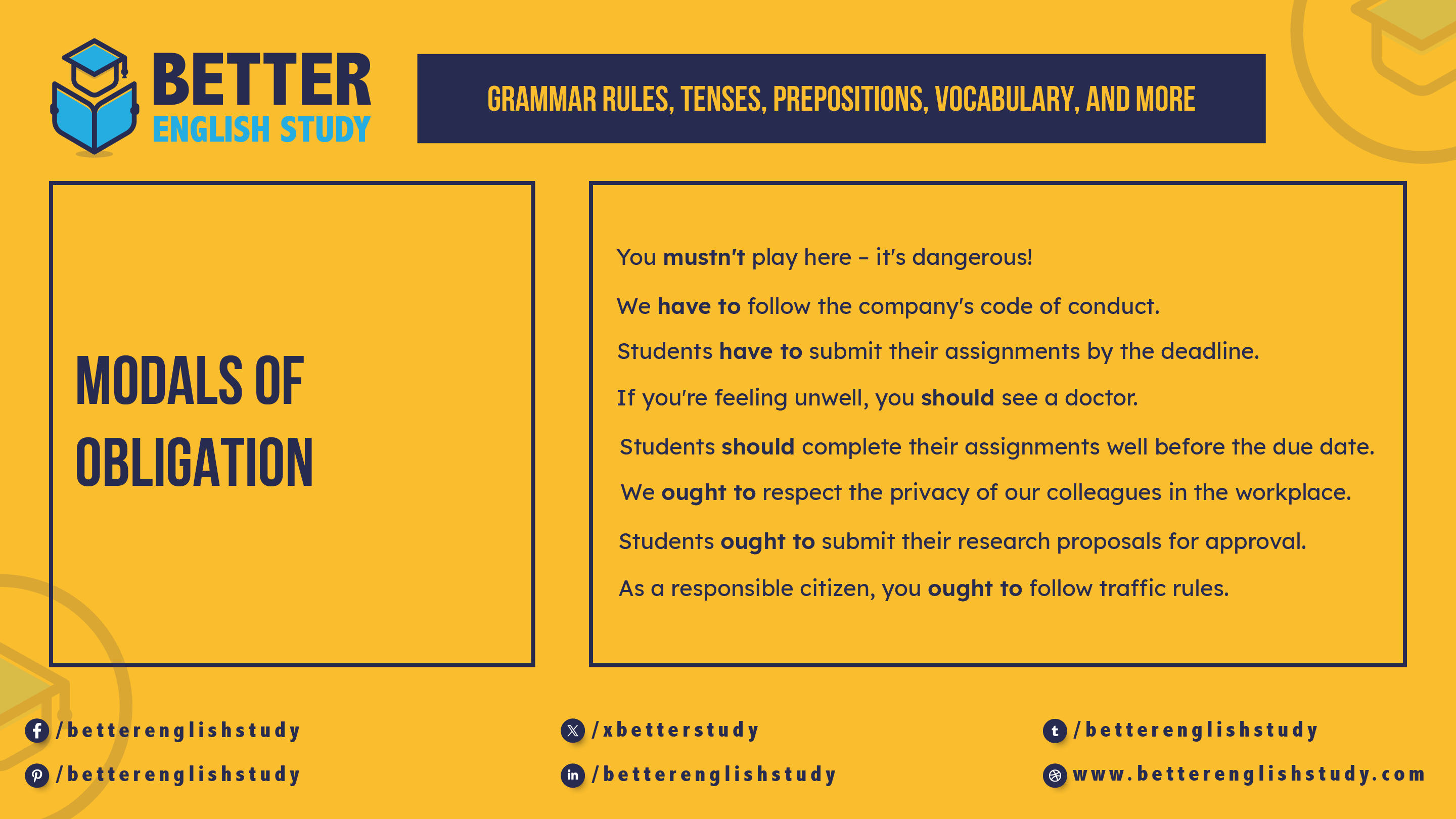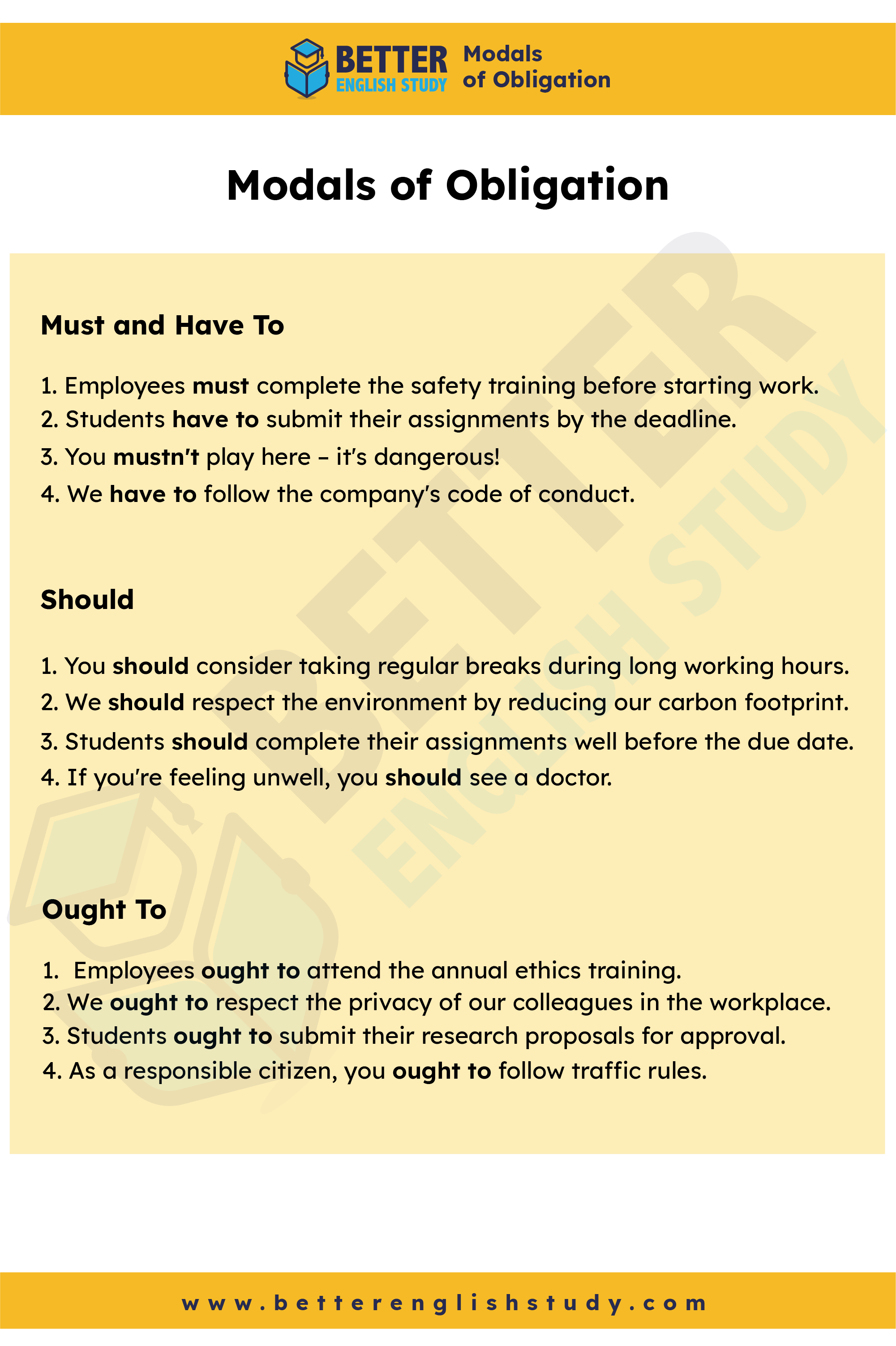
In the vast landscape of English grammar, modals stand as guideposts, directing us through the complexities of expressing obligation. Among the myriad modal verbs, ‘must,’ ‘have to,’ ‘should,’ and ‘ought to’ emerge as crucial tools when articulating commitments and responsibilities.
This exploration will unravel the nuances of these modals, shedding light on how they navigate obligations, rules, laws, strong advice, and warm invitations.
The Four Pillars of Obligation
The four most common modal verbs of obligations are must, have to, should, and ought to. These linguistic pillars provide us with the means to convey a sense of duty, necessity, or recommendation in various contexts.
Understanding the Landscape of Obligation
We use ‘have to,’ ‘must,’ ‘should,’ and ‘ought to’ plus the infinitive form of verbs to discuss obligations. These modals play a pivotal role in expressing a range of obligations, be it following rules, complying with laws, heeding strong advice, or responding to warm invitations.
Must and Have To: The Imperatives of Obligation
Must and have to are stalwart modals that indicate a strong sense of obligation, prohibition, or necessity.
Examples:
- Employees must complete the safety training before starting work.
‘Must’ emphasizes the mandatory nature of safety training.
- Students have to submit their assignments by the deadline.
‘Have to’ conveys a requirement with a sense of external compulsion.
- You mustn’t play here – it’s dangerous!
‘Mustn’t’ is employed to convey prohibition, indicating that playing in this area is strictly forbidden due to safety concerns.
- We have to follow the company’s code of conduct.
‘Have to’ emphasizes the mandatory nature of adhering to the code of conduct.
Should: A Beacon of Advice
‘Should’ is a versatile modal that signifies a recommendation, advice, or a less binding obligation.
Examples:
- You should consider taking regular breaks during long working hours.
‘Should’ suggests a piece of advice to consider, emphasizing the importance of breaks.
- We should respect the environment by reducing our carbon footprint.
Here, ‘should’ conveys a recommendation for environmentally conscious behavior.
- Students should complete their assignments well before the due date.
‘Should’ here indicates a recommended action for students, allowing ample time for completion.
- If you’re feeling unwell, you should see a doctor.
‘Should’ is used to offer advice, recommending a visit to the doctor for those not feeling well.

Ought To: A Formal Touch
‘Ought to’ is a slightly more formal modal, often used to express a strong sense of obligation or duty.
Examples:
- Employees ought to attend the annual ethics training.
‘Ought to’ conveys a formal sense of obligation, emphasizing the importance of attending ethics training.
- We ought to respect the privacy of our colleagues in the workplace.
Here, ‘ought to’ signifies a duty to respect the privacy of colleagues, adding a formal touch to the obligation.
- Students ought to submit their research proposals for approval.
‘Ought to’ is used to express a formal requirement for students to submit research proposals.
- As a responsible citizen, you ought to follow traffic rules.
‘Ought to’ conveys a sense of duty for citizens to adhere to traffic rules responsibly.
Navigating Forbidden Territories and Warm Invitations
To say something is forbidden or to indicate an obligation not to do something, ‘mustn’t’ is employed. For instance, “You mustn’t play here – it’s dangerous!” conveys a strict prohibition against playing in the specified area due to safety concerns.
On the flip side, when responding to warm invitations or expressing a courteous obligation, ‘should’ often finds its place.
Examples:
- You should come to our party next week.
- In this context, ‘should’ is used to extend a warm invitation, suggesting the desirability of attending the party.
- We should visit our grandparents over the weekend.
- ‘Should’ conveys a sense of familial obligation and a warm invitation to spend time with grandparents.
Rules to Navigate the Terrain of Obligation
- Must and Have To for Strong Obligation: Employ ‘must’ and ‘have to’ to convey strong obligations, whether dictated by rules, laws, or necessities.
- Should and Ought To for Recommendations and Formality: Use ‘should’ for advice and ‘ought to’ for a more formal touch when expressing obligations.
- Mustn’t for Prohibitions: Employ ‘mustn’t’ to clearly state that something is forbidden or prohibited.
- Context Matters: Consider the context when choosing the appropriate modal. ‘Should’ and ‘ought to’ may provide a softer tone in recommendations, while ‘must’ and ‘have to’ convey stronger obligations.
Mastering the modals of obligation – ‘must,’ ‘have to,’ ‘should,’ and ‘ought to’ – is akin to acquiring a compass for navigating the landscapes of commitment and responsibility in English.
These modals serve as linguistic tools, allowing us to articulate obligations, heed advice, and extend warm invitations with precision and grace. By understanding the distinct nuances of each modal, language learners can confidently express a spectrum of obligations, ensuring effective communication in various situations.
As you integrate these modals into your linguistic toolkit, you embark on a journey of mastering the art of obligation in English, forging pathways of clear and courteous communication.
